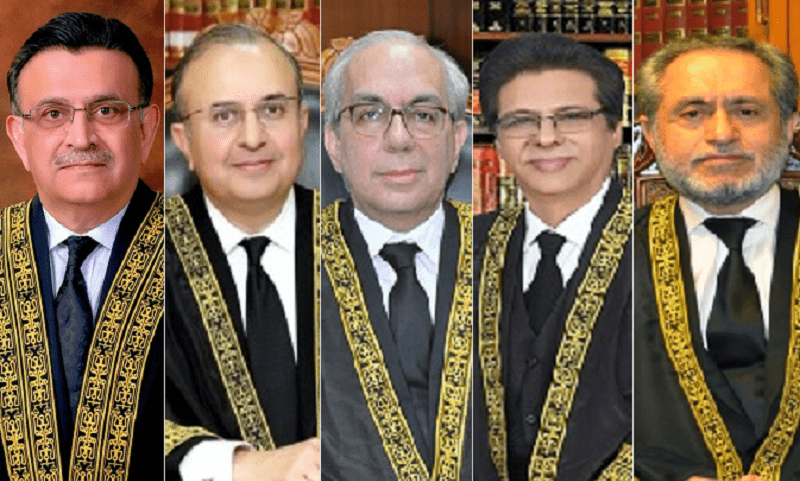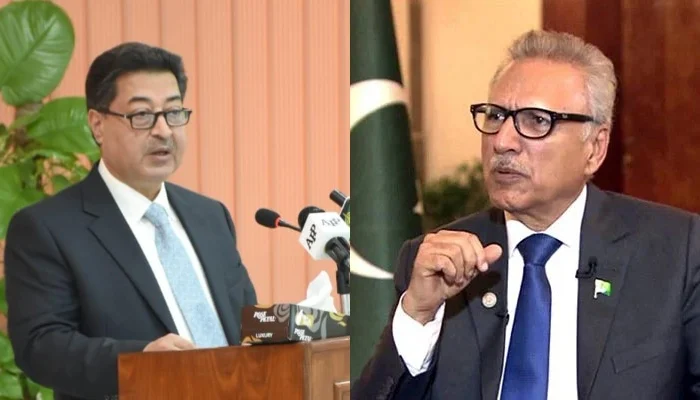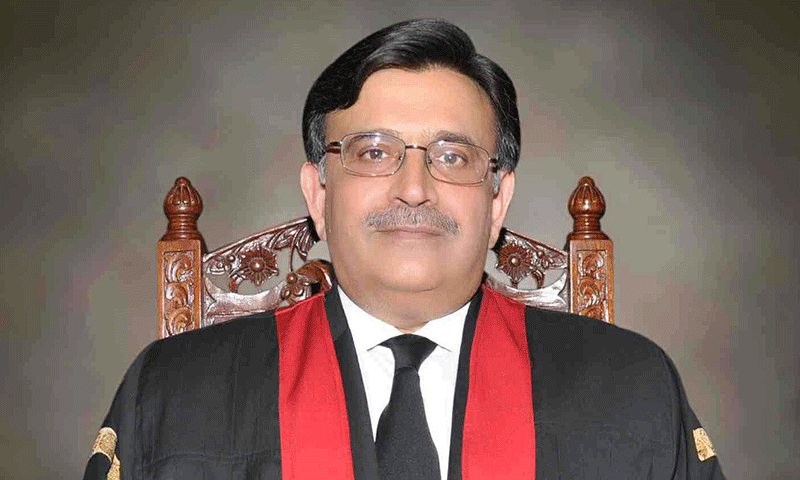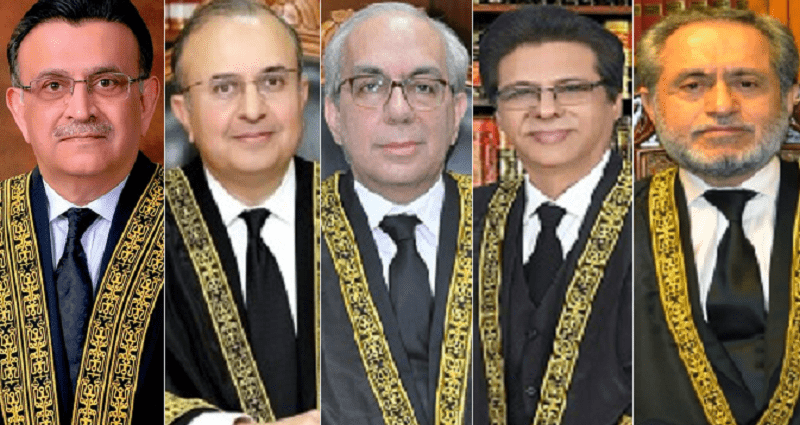
Justice Ahsan, Justice Yahya Afridi, Justice Mazahar Naqvi & Justice Athar Minallah recuse themselves from hearing election suo motu case
CJP Umar Ata Bandial says law clearly mentions president can announce poll date
Justice Yahya Afridi questions invoking suo motu jurisdiction; dismisses all three petitions in his dissenting note
ISLAMABAD ( Web News )
Chief Justice of Pakistan Umar Ata Bandial said Monday that the parliament has clearly written in the Elections Act, 2017, that the president can announce the date for polls.
After deciding that Khyber Pakhtunkhwa (KP) and Punjab Governors — Haji Ghulam Ali and Engineer Mian Muhammad Balighur Rehman — and the Election Commission of Pakistan (ECP) were not fulfilling their constitutional duties to announce the date for polls in both provinces, President Dr. Arif Alvi announced earlier this month that elections would take place in April — a move that drew strong criticism from the government.
Meanwhile, the CJP’s remarks came during the suo motu hearing related to the elections in Khyber Pakhtunkhwa and Punjab. The bench, which earlier constituted nine members, now comprises only five members.
The bench was reconstituted after Justice Ijazul Ahsan, Justice Yahya Afridi, Justice Sayyed Mazahar Ali Akbar Naqvi and Justice Athar Minallah recused themselves from hearing the case.
The hearing of the case was scheduled to start on Monday at 11:00 AM; however, it was delayed reportedly due to the bench formation in the light of a Supreme Court order of the February 23 hearing.
A written order was issued on the SC’s website in which dissenting notes of Justice Afridi, Justice Minallah, Justice Jamal Khan Mandokhail and Justice Syed Mansoor Ali Shah had been included.

Following this, a five-member bench headed by Chief Justice Umar Ata Bandial and comprising Syed Mansoor Ali Shah, Justice Munib Akhtar, Justice Jamal Khan Mandokhail and Justice Muhammad Ali Mazhar and was formed which presided over Monday’s hearing.
The newly-formed bench — after the counsel of speakers from both provinces, Senator Barrister Syed Ali Zafar concluded his arguments — adjourned the hearing of the case till today (Tuesday) 9:30 AM.
When the hearing began, CJP Bandial shared that four judges had recused themselves from the bench.
“The rest of the court’s bench will keep on hearing the case,” said the CJP. He added that the court will continue hearing the case for the interpretation of the Constitution.
The CJP also noted that till the written order is not released on the website they cannot issue it. He noted that Justice Mandokhail’s dissenting note was shared on social media before the written order was released. “We will be careful that this does not happen in the future,” said the CJP.
The court then directed Barrister Ali Zafar, the counsel for the speakers of the Punjab and Khyber Pakhtunkhwa assemblies, to argue whether the court should hear the case or not.
“Can the court hear this case or not? In any situation, the case has to be completed tomorrow,” said the CJP.
At this, Pakistan Peoples Party (PPP) lawyer interjected that the ruling parties had filed a plea for the formation of a full court.

The CJP then remarked that they will hear all the pleas and decide them.
Following this, Zafar, the lawyer representing the speakers’, began his arguments and said that the Punjab chief minister had sent the summary for the dissolution of the assembly to the governor.
“The governor was bound to dissolve the assembly, however, he did not and the assembly was automatically dissolved 48 hours after his refusal,” said Zafar.
The lawyer said that no constitutional officeholder can delay elections for more than 90 days, and the 90-day period in Punjab started on January 14.
“Who appoints the governor?” questioned Justice Mazhar.
At this, Zafar said that the governor is appointed after the president’s approval.
Upon hearing this, Justice Mazhar remarked that there is a difference between an assembly being dissolved by the governor and its dissolution by itself following the completion of the constitutional term.
While Justice Mandokhail asked whose job is it to decide the date for elections.
At this, Zafar said that a suo motu notice has been taken regarding a date for the elections.
“There is no such provision in the Constitution that justifies delay in the elections beyond the 90-day time limit,” remarked Justice Mazhar.
“Can the elections be delayed by someone?” he asked.
To this, Zafar said that no one can delay the elections.
Justice Mazhar said that the Punjab governor threw the ball in the Election Commission of Pakistan’s (ECP) court.
“Ping pong is being played over the election date,” Zafar told the bench.
Meanwhile, Justice Shah inquired if the case in the Lahore High Court (LHC) was adjourned at the request of the parties.
At this, Sheikh Rashid’s lawyer Azhar Siddique told the bench that the case in the high court was adjourned because the matter was being heard in the apex court.
While Zafar told the bench that no stay order had been issued on the intra-court appeals by the LHC.
Upon hearing this, Justice Shah wondered whether any contempt of court petitions had been filed in the LHC after it had given the orders for the announcement of a date for the polls.
At this, Zafar informed that a contempt of court plea had been filed against the ECP. While Sheikh Rashid’s counsel added that the electoral body had submitted a vague reply over the contempt plea.
At this point, CJP Bandial asked if any reason was provided for such a long adjournment on the intra-court appeal in Lahore.
“Without a solid reason, hearing on such an important matter cannot be adjourned for too long,” he observed.
Siddique told the court that the ECP sought time to submit a reply to the LHC and hence, the hearing was adjourned.
“Election Commission failed to respect the high court’s orders,” Zafar told the court.
Siddique said that the contempt of court plea was filed on February 14 in the LHC and a response was sought from the ECP.
“The president wrote two letters on the matter,” said Zafar, adding that the letter — sent on February 8 — sought a date for elections from the ECP.
At this, the CJP inquired if the ECP responded to President Arif Alvi’s first letter.
Zafar replied that as per his information, the ECP did not respond to the president’s first letter.
Meanwhile, Justice Shah remarked that the president’s letter was contrary to the high court’s order.
“The high court had asked to give the date after consultations with the governor,” he said, adding that the president asked the electoral body to give a date for elections.
At this, Justice Mazhar said that the ECP had written in its reply that consulting with the governor is not in the Constitution.
“If the consultations did not take place then the commission should have given a date itself,” he added.
The ECP says that it cannot give a date for the elections, said Zafar. He added that the real issue is that no one wants to give a date for the elections.
He said that the president, in his letter, had clarified all the facts regarding the date of the elections.
On this, Justice Mandokhail asked if someone had approached President Dr. Arif Alvi for the election date or if he gave it unilaterally.
The president had to intervene as it was a matter of basic rights, said Zafar, adding that “someone has to announce a date”.
Zafar said that if the court believes that ECP should give the date then it should issues orders to it.
“If the parties think that the elections are to be held by some other organisation then they should inform the court as well,” he added.
At this point, Justice Akhtar asked about the situation in KP.
On this, Barrister Zafar informed the court that the governor had dissolved the assembly in KP and asked the ECP to hold consultations with the stakeholders.
“The KP governor has made the security a basis in his letter,” he said. As far as the election date was concerned, even the KP governor has not given a date, he added.
Meanwhile, the lawyer representing the ECP informed the bench that three constitutional pleas were under trial in the Peshawar High Court (PHC).
At this, CJP Bandial inquired why had the high court given a 21-day notice to the parties.
“A legal point has to be decided. It’s not a civil suit that so much time was given,” the CJP remarked.
At this, Zafar interjected that the KP assembly was dissolved on January 18.
“What progress has been made on the elections in KP,” CJP Bandial asked.
Meanwhile, Justice Mandokhail asked whether the governor could suggest holding consultations citing terrorism.
At this, Zafar told the court that in his opinion the KP governor did not have the authority to write such a letter.
“This case is now based only on the question of who has the authority to give the election date,” CJP Bandial remarked.
Meanwhile, Justice Mansoor remarked that the ECP was saying that the option of consultation for deciding a date for the election is not written in the Constitution.
At this, Justice Mazhar asked if it would be a contempt of court if the ECP itself gave the date.
Responding to the question Zafar said that all of it was the “delaying tactics” and ECP giving the election date was constitutional.
“The suo motu notice asks who will give the election date,” Justice Mandokhail remarked.
At this, Zafar said that someone has to announce a date. He said that it cannot be the case that the election is delayed for 10 years, therefore the other party should tell who can give the date.
CJP Bandial remarked that the reason should be stated if the circumstances were not suitable for holding elections.
Meanwhile, Justice Mazhar regretted that the election date couldn’t be announced even after a month since the dissolution of the assembly.
Justice Mazhar said that when the election date is announced, a decision will be made on whether polls can be conducted on that date or not. He added that a whole month was wasted just because the governor had said to hold consultations.
“Ensuring law and order is ECP’s responsibility, and not of the governor,” highlighted Justice Mandokhail. He inquired whether the matter pertaining to the law and order can become a hindrance to the constitutional requirement of holding elections.
The CJP recalled that the assemblies in 2013 and 2018 had completed their terms.
At this point, ECP’s director general (DG) law said that the president announces the date of elections if the assembly completes its term.
Meanwhile, Justice Akhtar remarked that the chief minister’s advice was implemented in KP but not in Punjab.
“If there are no assemblies then there is no other way of governance in the Constitution. This is why a 90-day limit has been set for the elections,” said Barrister Zafar.
He stressed that the elections must be held within the 90-day period.
“The Election Commission’s job is to conduct elections,” said CJP Bandial.
Zafar said that the ECP is responsible for the arrangement of polls and conducting the elections. “The ECP has to conduct national, provincial and local polls as per the Constitution,” he added.
“The ECP is responsible to hold elections under Articles 218, 219, and 222 and all the executive institutions are bound to assist the ECP in conducting polls,” said Zafar.
He said that the court should take action if the ECP shows helplessness.
The CJP then adjourned the hearing for a recess and adjourned the hearing till 4pm.
When the hearing resumed after the break, Justice Syed Mansoor Ali Shah asked who is responsible for issuing the notification for the dissolution of an assembly.
“The election commission issues the notification for an assembly’s dissolution,” Zafar said. At this, Justice Mandokhail asked the counsel whether the ECP could issue a notification for the dissolution.
Justice Shah then said that the record shows that the then-government had issued the notification for the assembly’s dissolution.
Justice Mandokhail said that someone must have issued directives prior to the notification of the dissolution. Then Justice Shah asked that is the governor’s role restricted to that of a post office in parliamentary democracy.
“Can the governor dissolve the assembly at his discretion?” asked Justice Shah. Justice Akhtar said that it is the governor’s discretion to send the summary back or sign it.
“But the governor does not have any authority over the assembly’s dissolution. If the governor does not sign the summary for the assembly’s dissolution, then it stands dissolved automatically.”
In his opinion, Justice Shah said that it is the governor’s discretion whether he wants the assembly dissolved or not.
“No, it isn’t up to the governor’s discretion,” Justice Akhtar said. He added that even if the governor sends back the summary, the 48-hour period is still going on.
Justice Shah then took a swipe at Barrister Zafar and said: “Mr Ali, you are saying absolutely in response to every question. Are you agreeing with everyone’s questions?”
Under Article 112 of the Constitution, there are two options — the governor either approves the summary or refuses to, Justice Shah said, adding that the article’s sub-section also notes that it is the governor’s discretion whether he wants to dissolve the assembly or not.
“Now, tell me, does the governor have the power or is his role just mechanical?” Justice Shah wondered. In response, Justice Akhtar said that if the assembly dissolves 48 hours after the summary is moved, then who issues the notification?
Justice Mazhar then said questions cannot be raised over the governor’s discretionary powers. Justice Mandokhail asked at what time does the 48-hour period exactly begins after the governor sends back the summary.
In response, Barrister Zafar said that in his opinion, the governor cannot send back the summary of the assembly’s dissolution.
Justice Akhtar then said that issuing an election date is a constitutional obligation. In some situations, it is the governor’s job and in some, it’s the president’s job, he said.
He added that the Constitution was mum on placing responsibility on an office for announcing elections back in 1976. He added that the assembly amended the Constitution and gave powers to the president and the governor.
“I believe that when it comes to Punjab, the president was right to issue an election date,” Justice Akhtar said. Then, Justice Mandokhail asked that if both — president and governor — issue an election date, then whose orders will be followed?
Barrister Zafar said that if a provincial assembly is dissolved, then the governor’s orders will be considered. Then Justice Akhtar said that if the governor dissolves the assembly and does not issue an election date, then the court can direct relevant officials to announce a date.
CJP Bandial then asked under which procedure the governors and president announce the election date. He said that in line with the law, both of them should consult the ECP before announcing the date.
“It is an important issue, and we should review what the president consults with the ECP. We want to know on what matters does the president exactly consult with the ECP.”
Justice Shah then said that if the governor does not announce the date, then can the ECP unilaterally issue the date. Barrister Zafar said that the election commission is a constitutional body and should have the authority to issue the date.
Interjecting, Justice Akhtar said that the Constitution should be very clear on the issue.
CJP Bandial said that the parliament has clearly written in the elections act that the president can also issue the election’s date. Then, Justice Mandokhail said that if the country does not have the money to hold elections, then what will happen?
Justice Akhtar then said that it is “surprising” that the country has enough funds to host cricket matches, but it cannot hold elections.
Barrister Zafar said that the ECP has already informed the SC about its preparations for the elections. Justice Mazhar said that the preparations will take place when the election date is announced.
Justice Akhtar said how is it possible that elections don’t take place due to a shortage of funds.
The election commission has suggested dates to the governors, Barrister Zafar said, adding that the ECP should always be ready for holding elections as any assembly can be dissolved at any given time.
Meanwhile Justice Yahya Khan Afridi of the Supreme Court has objected to invoking suo motu jurisdiction by the chief justice in the election date case.
In his additional note, made public on Monday along with the court order on the February 23 hearing, the apex court judge questioned the logic behind taking the suo motu notice despite the fact that the matter was pending before the high court in Punjab and Khyber Pakhtunkhwa.
Justice Afridi also recused himself from the nine-member bench hearing the case after which a new five-judge bench was constituted headed by Chief Justice Umar Ata Bandial.
“For detailed reasons to be recorded later, it appears that prima facie these petitions fall within the purview of Article 184(3) of the Constitution of the Islamic Republic of Pakistan, 1973. However, it would not be judicially appropriate to exercise the power to make an order under the aforementioned provision of the constitution given that the matters raised in the petitions are presently pending adjudication before the Lahore High Court (LHC) in Intra-Court Appeal No. 11096 of 2023, Contempt of Court Petition No. 10468/W/2023, and the Peshawar High Court in Writ Petition No. 407-P/2023.”
While noting that the jurisdiction under Article 184(3) is “not affected by the pendency” of any matter before any other court or forum, the LHC verdict and “peculiarly charged and unflinching contested political stances” taken by the parties, warrant this court to show “judicial restraint” to bolster the principle of propriety.
The judge further added that this is to avoid any adverse reflection on the Supreme Court’s judicial pre-emptive eagerness to decide.
“Therefore, passing any finding or remarks during the proceeding of the present petitions by this court would not only prejudice the contested claims of the parties in the said petition/appeal pending before the respective high courts but, more importantly, offend the hierarchical judicial domain of the high court as envisaged under the Constitution. It would also disturb the judicial propriety that the high court deserves in the safe, mature, and respectful administration of justice. Accordingly, I dismiss these three petitions.”
“Having decided that exercising powers under Article 184(3) of the Constitution in the present three petitions pending before us would not be appropriate, I find that my continuing to hear the said petitions is of no avail. However, I leave it to the worthy chief justice to decide my retention in the present bench hearing the said petitions.”

